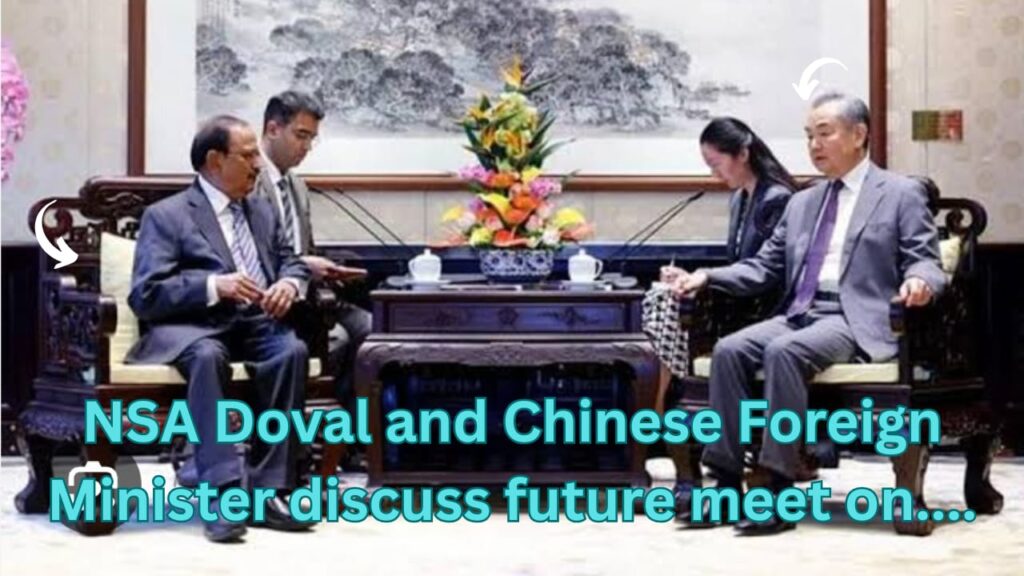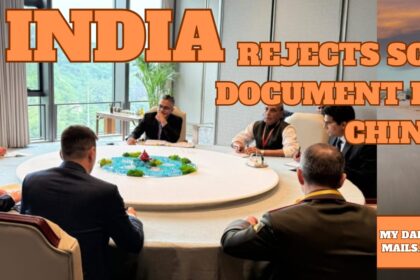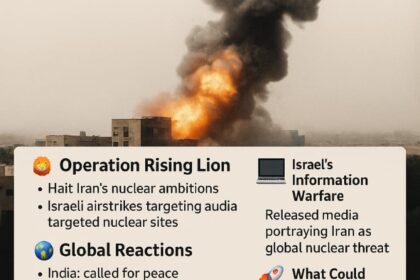India-China-Russia Triangle: Ajit Doval’s Beijing Visit, SCO Summit & Strategic Stakes in 2025,
NSA Ajit Doval’s China Visit and India’s Role in the Upcoming SCO Summit.

Introduction: A High-Stakes Visit by India’s NSA
India’s National Security Advisor (NSA) Ajit Doval recently visited Beijing, grabbing headlines both in national and international media. Very few NSAs in the world receive such widespread coverage for their foreign visits. Doval’s reputation as India’s top security strategist and former intelligence officer adds intrigue to his engagements abroad.
His recent visit to China has rekindled strategic discussions around India-China bilateral ties, regional security, and the Shanghai Cooperation Organization (SCO) Summit to be held later this year in China.
Ajit Doval in China: Key Highlights of the Visit
| Event | Details |
| Visit Location | Beijing, China |
| Purpose | Strategic meetings ahead of the 2025 SCO Summit |
| Key Officials Met | Chinese Foreign Minister Wang Yi and other top Chinese diplomats |
| Main Message Delivered | India condemned China’s double standards on terrorism |
| India’s Stand | Called for real-time terror info sharing within SCO |
| Other Agendas | Kailash Mansarovar developments, bilateral market access, border tensions |
Ajit Doval’s message was bold and clear—India will not accept selective narratives on terrorism. Speaking inside China, Doval asked Beijing to shed its double standards and support a more transparent anti-terror mechanism within the SCO.
Why Is This Visit So Significant?
Doval’s visit isn’t just a diplomatic formality—it’s part of broader geopolitical preparations. The SCO Tyanzhan Summit, scheduled later this year, will host key global leaders including:
- Vladimir Putin (Russia)
- Xi Jinping (China)
- Shehbaz Sharif (Pakistan)
- Possibly, Prime Minister Narendra Modi (India)
SCO Preparations in Full Swing
NSA-level, defense, and foreign ministers’ meetings are being held in advance of the main leaders’ summit. Ajit Doval’s presence in Beijing confirms India’s active involvement in shaping the summit agenda.
China’s Mixed Messaging: Can the Dragon-Elephant Dance Work?
While Chinese diplomats publicly stress that “only when the Dragon and Elephant dance together can we achieve a win-win outcome”, their actions contradict this message. Here’s why:
| Contradictions by China | Details |
| Supplying arms to Pakistan | PL-15 missiles and 5th-gen fighter jets |
| Ignoring border resolution talks | Stalemate continues at LAC since the Galwan clashes |
| Backing Pakistan in SCO despite India’s protest | Reduces SCO’s credibility in India’s eyes |
These contradictions expose the gap between China’s diplomatic statements and its strategic behavior.
Russia’s Strategic Push: Strengthening the RIC Format
Russian President Vladimir Putin is working actively to revitalize the Russia-India-China (RIC) trilateral framework. His proposal includes:
- A long-term cooperation plan with India till 2030
- Greater collaboration in energy, manufacturing, and defense
- A probable visit to India later in 2025
During Doval’s China visit, he also interacted with the Russian NSA, reaffirming Moscow’s desire to enhance strategic cooperation with New Delhi.
Will PM Modi Attend the SCO Summit in China?
Context and Possibilities
| Event | Details |
| 2024 SCO Summit | Held in Pakistan; PM Modi did not attend |
| Representation | Dr. S. Jaishankar attended on India’s behalf |
| 2025 SCO Summit | Hosted by China in the autumn season |
| Leaders expected | Putin, Xi Jinping, Shehbaz Sharif, among others |
| India’s Dilemma | Will PM Modi break the trend and attend in Beijing? |
If Prime Minister Modi decides to attend, it could signal a major breakthrough in India-China relations and provide a platform for broader trilateral cooperation with Russia.
The BRICS vs SCO Debate: Which Platform Holds More Value for India?
Many analysts argue that BRICS holds more strategic value for India because:
| Aspect | BRICS | SCO |
| Pakistan Membership | Not a member (and unlikely to join) | Member, causing credibility issues |
| India’s Veto Power | Can block new entries | No veto on member inclusion |
| Strategic Alignment | More balanced power sharing | China-Pakistan bloc dominates |
| Information Sharing | Limited risk of compromise | Realistic? Unlikely, due to Pakistan |
India’s role in SCO is seen as a balancing act. Yet, New Delhi’s concerns over terror collaboration, especially with Pakistan involved, cast doubt on the organization’s effectiveness.
Doval’s Stand: Terrorism, Sovereignty, and Realism
Ajit Doval made it clear during his Beijing visit that:
- India demands joint terror info operations within SCO.
- Double standards must end—pointing directly at Pakistan and China’s role.
- SCO must function as a security-focused body and not as a political platform.
This realism reflects India’s strategic maturity and willingness to confront uncomfortable truths within multilateral forums.
What Lies Ahead: A Big Strategic Realignment?
Key Indicators of a Shift:
- Putin’s Visit to India in 2025 (tentatively planned)
- India-China backchannel talks post Doval’s visit
- SCO Summit diplomacy—a test of India’s regional influence
If successful, these events may reset India’s regional standing and open new possibilities in Eurasian geopolitics.
FAQ’s
Q1: Why did Ajit Doval visit China in 2025?
Ans: To attend pre-SCO strategic meetings and engage with top Chinese and Russian officials on terrorism, security, and economic cooperation.
Q2: Will PM Modi attend the SCO Summit in China?
Ans: It is uncertain, but if he does, it could mark a major shift in India-China ties.
Q3: What was India’s main message to China?
Ans: India urged China to drop its double standards on terrorism and promote transparency within SCO.
Q4: What’s Russia’s role in all this?
Ans: Russia is pushing for stronger trilateral cooperation via the RIC format and has proposed a long-term partnership plan with India.
Q5: Is SCO effective for India’s goals?
Ans: India views SCO with caution due to Pakistan’s presence and limited strategic outcomes, unlike BRICS.
Conclusion: Diplomacy in Action or Just Another Show?
Ajit Doval’s Beijing visit reflects India’s proactive diplomatic engagement ahead of the SCO Tyanzhan Summit. But it also raises questions:
- Can SCO truly be a neutral security forum with China and Pakistan on the same table?
- Will India’s demands for transparency and real counter-terror action be honored?
- Should PM Modi attend the summit to influence the agenda or skip it to send a message?
As the world watches, India stands at a diplomatic crossroads, and the choices made in the coming months could redefine Asia’s strategic equation.
External Links:






